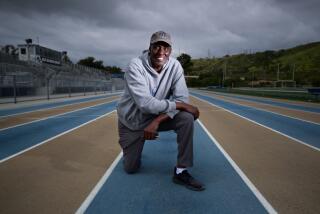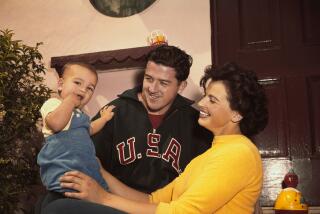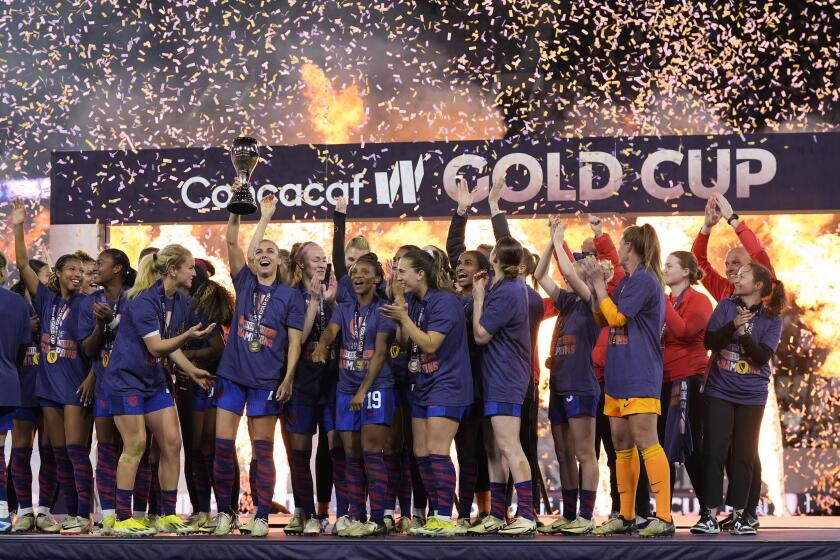Word on the streets
The assembled students, the Saints of Locke High, looked at the 6-foot-3 figure in front of them, not knowing how famous this man had been, once.
They didn’t know this man had won an Olympic gold medal, once. That he had beaten Mike Tyson to get there. That he had one of the most powerful jabs ever seen, once.
Or that he had been to prison, twice. Three if you count the California Youth Authority facility in Chino, where he served time for armed robbery. But that was before he won gold.
Yet here was Henry Tillman, no saint himself, a former juvenile delinquent, reaching out to these Saints, whose high school on 111th Street is only about eight minutes away from the scene of his unvarnished glory. He was 24 then, the oldest and least experienced member of the 1984 U.S. Olympic boxing team.
“Ever hear of Mike Tyson?” he asked the students.
If that didn’t get their attention, his story did.
“I’m lucky to be here,” Tillman said.
They heard about his rise and fall, only to fall again, and now rise again.
Barry Sanders, chairman of the city’s 2016 Olympics bid, worked with Tillman in the Rebuild L.A. project that was born of the 1992 riots. Now, with a new L.A. program that matches former Olympians with Los Angeles district schools to promote physical fitness and the Games, Sanders knows what he has in Tillman.
“Each and every Olympian brings an inspirational quality to young people, and is an example of how to build a life of achievement and satisfaction,” Sanders said. “However, Henry Tillman is a particularly appropriate person because of the special challenges he has faced -- before and after winning a gold medal.”
The students at Locke weren’t born when Tillman won gold at the Sports Arena, but his words and his shiny Olympic medal on display that day resonated.
A confluence of events made it more so.
Locke basketball Coach Stephen Minix said Tillman’s visit was fortuitous. Only a few days before, the students were coping with a random shooting on the streets nearby -- the captain of the football team and basketball team, Lafayette Taylor, had been wounded as he walked home from practice.
*
Tillman, 46, knows these streets.
These streets have long had his number, even after he became an Olympic hero and then blasted through his first 10 pro fights without a loss.
“My mother used to always say the streets was calling me,” Tillman said.
Now, after serving two terms in prison for separate offenses, he considers what would happen if the streets come calling again.
“I won’t answer,” Tillman said, smiling.
A native of South Central Los Angeles who counts more street fights in his resume than ones in the ring, Tillman seemed poised for a glittering boxing career after the Olympics. When he married Jesse Owens’ granddaughter, Gina Hemphill, in 1987, his difficult past seemed just that -- past.
One person who shakes his head at how things turned out is the man Tillman beat to win the gold medal. Canadian Willie de Wit, who like Tillman turned pro to some success after 1984, is now a criminal defense attorney in Calgary.
Tillman went the other way, needing a criminal defense attorney.
The first time was in 1996 and involved a fatal shooting. Tillman was charged with attempted murder and voluntary manslaughter. But the judge declared a mistrial after prosecutors failed to fully disclose the criminal record of a police informant who had agreed to testify against Tillman.
Then, just as prosecutors were set to go a second time, Tillman accepted a plea bargain. That was in 2000.
“Obviously, it’s a big surprise,” De Wit said in a telephone interview. “An Olympic gold medal for the U.S. should be a good steppingstone.”
Tillman’s stumble and the events leading to his murder trial were covered in exhaustive detail, including a 1,769-word profile in The Times, detailing his early days in the juvenile justice system and improbable, swift ascent to the Olympics and sputtering pro career.
Hemphill, who divorced Tillman in the late ‘90s, said in that 2000 article that she still cared about him, but others weren’t so openly forgiving. Former boxing trainer and mentor, Mercer Smith, said in the same article of Tillman, “He blew everything.”
His plea bargain meant freedom in 2002, but, unfortunately for Tillman, that didn’t last.
“I was out and I really didn’t have a plan,” Tillman said. “Worked nights at a restaurant. At the beginning, I was working seven days a week. I got tired with it. I got bored with it.”
Boredom, in part, led to Las Vegas. In March 2004, Tillman entered a guilty plea to federal identity theft charges, resulting in a 37-month prison sentence. He had been arrested with five others shortly after a Wells Fargo bank teller reported that a woman attempted to pass a counterfeit check of $2,838.
Court papers stated that officers recovered 18 counterfeit checks in various company names and eight counterfeit credit cards in Tillman’s vehicle.
Unlike the 1996 case, there was no trial in Las Vegas. Tillman’s attorney in the shooting incident had argued it was a case of mistaken identity.
Of the Las Vegas case, Tillman speaks differently, accepting the blame himself.
“They called it fraud, kind of a long story,” he said. “It is what is was. I’m not innocent of it. It’s my fault. I put myself in a position to be around it. If you put yourself in a bad situation, and if you pray on it, God will show you how to pull the positives out of it and move forward.”
Tillman served his sentence in Lompoc, in the “high-security” area of the federal facility, and said he saw the incarceration as a way to get an education. This wasn’t new for him. It was at the Chino facility in 1981 that he learned from Mercer Smith how to box.
“It’s what you make of it,” he said of his time at Lompoc. “If you think you’re in prison ... I told my mind, ‘I’m in college, a college institution.’ ”
The road to redemption, and perhaps more accurately, relevance, has several branches for Tillman. One was at an elementary school in Venice in late October and another at Locke.
“I was excited,” said 14-year-old Jacob Martell, a freshman at Locke who wants to get into boxing. “First time I’ve ever been close to a heavyweight champion. I never thought somebody like him would come over here. Not over here.”
Sanders said the students can recognize a man who knows how to deal with difficulties and transcend them, noting that Tillman grew up not far from Locke.
“He understands the students, and they sense it. Further, I have always known him to be a warm and caring man who loves the community. When he speaks, the students listen.”
Tillman is aware of the impact he has.
“A lot of them they can relate,” he said of the students at Locke that day. “After a minute, they can tell, ‘I know you went through some things.’ It’s not like you went to Yale University and you’re coming down here to tell you about something you shouldn’t do. I’m telling you about something I’ve done. Not something I’ve read about.
”... It’s only right to try to give back, with nothing else, your time and your life experiences. And the good out of it and the bad, so the kids won’t make the same mistakes I made.”
A stark reminder of past mistakes is almost within eyeshot of Richie’s Cafe & Grill, where he works. The eatery is east of downtown and surrounded by bail bonds shops -- all within a short distance of the Men’s Central Jail.
Tillman, in the second of two interviews, spoke at a table at Richie’s. In fact, the card he hands out for contact information at Richie’s has a map on the back listing the words “L.A. County Jail” as the main landmark.
Richie’s owner Sal Chamsi has been a fan since Tillman’s boxing days. After Tillman finished serving his sentence at Lompoc, Chamsi gave the former athlete a job, teaching him the ropes of running a small business.
It’s one thing to read books in prison and take computer classes, but solving problems on the spot, such as dealing with the ice machine breaking down on a hot day, was another hurdle.
Tillman’s ease in talking to the customers was just as natural as at Locke. For many, Richie’s may well be the first stop after getting out of jail.
“I hear all the stories from all the old guys,” Tillman said. “I told one dude the other day, ‘You just got out a minute ago.’ I said, ‘Let me ask you a question: Would you like to see your little brother go in there?’ He said, ‘No, that place is crazy.’ I said, ‘You love your little brother more than you love yourself.’ You keep going back. But you say you don’t want your brother going there.”
Tillman said he is engaged with no wedding date set and wants to go back to school next year. For him, there seems to be no sense of rushing things as he tries to get back on his feet -- again.
Now comes the most important question: Will he really not answer the phone should the streets call out again?
“Some people just blossom quicker than others,” Tillman said. “Some people struggle, then all of a sudden they blossom. I never gave up. I refused to quit.”
More to Read
Go beyond the scoreboard
Get the latest on L.A.'s teams in the daily Sports Report newsletter.
You may occasionally receive promotional content from the Los Angeles Times.






